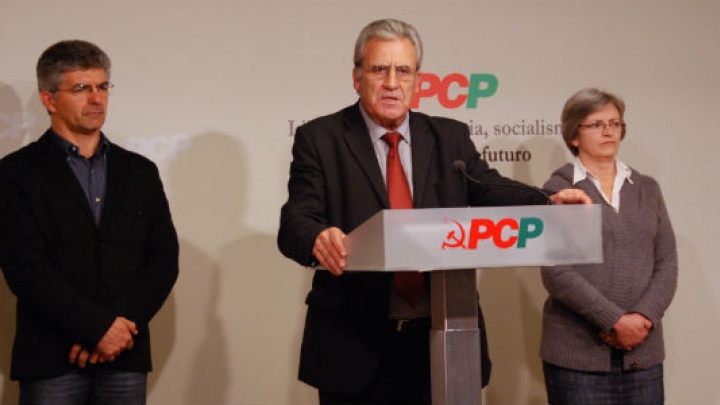PCP Central Committee Meeting
At its meeting today, the Central Committee analysed the country's economic and social situation, as well as the recent developments arising out of the Prime-Minister's resignation and the dissolution of the Assembly of the Republic [parliament]. Among other matters, it debated and established general guidelines for the Party's participation in the early general election called for 5 June, having decided to run as part of the CDU [coalition].
It considered that the current political crisis is both an expression and a direct consequence of the economic and social crisis into which the PS [Socialist Party], PSD [Social-Democratic Party] and CDS-PP [Democratic-Social Centre – People's Party] – with sponsorship from the President of the Republic – have led the country. This crisis is inseparable from the capitalist integration path taken by the European Union, and from crisis of the capitalist system itself.
The political crisis is, first of all, the outcome of a deliberate setup by those who – while being responsible for the serious situation the country is in – are now seeking to shirk the blame, and to hide the fact that they have taken identical stances on all the key actions that have led to this national decline. This situation is also inseparable from the increasingly acute contradictions generated by the anti-people character of current policies, and from the government's growing isolation as a result of broader struggles by working people and local communities.
The Central Committee considers that the early general election set for 5 June is, in this context, both an opportunity and a responsibility for Portugal's workers and people. It is an opportunity to make their voices heard, and to assert – by voting CDU – that it is necessary and essential to break with the path of decline, injustice and impoverishment for Portugal.
The seriousness and extent of the problems Portugal is facing today has its causes and its causers. They are not just the result of a set of circumstances, or of fate, but are rather the result of year upon year of right-wing policies that have generated a mountain of injustices, shrunk productive capacity, alienated strategic resources and assets, pawned national sovereignty, and impoverished the democratic regime.
The outcome is out there for all to see: a country subordinated to domination by national and foreign capital. Through pressures and blackmail, national and foreign capital is plundering the wealth produced in the country – through a process of subordination of political institutions to their class interests. Portugal is poorer, less developed and more dependent, on a path whereby year after year problems pile up and become more serious and where, while new sacrifices and injustices are being imposed on people there are less and less prospects of a way out and a solution.
The beginning of 2011 is there to prove it: the PECs (Stability and Growth Programmes) and the State Budget, that were presented and justified as being a necessary evil in order to overcome difficulties, have in fact themselves become factors that deepen the crisis and the recession, that increase unemployment, that heighten foreign dependence, where private debt is larger than public debt, and that raise the public accounts deficit they purport to be fighting.
From one PEC to the next, from one Budget to the next, the unacceptable dilemma into which the PS, PSD and CDS-PP want to place Portugal, is to either become a hostage of finance capital speculation in the “markets” or to spend decades in the stranglehold of speculative interest rates designed to favour that same finance capital – as defined by the European Union and the IMF, and with unacceptable and ruinous conditions attached.
The PEC-4 put forward by the Government sought to continue even more determinedly on that path. It did not include any measure for economic growth, greater national production, or fairer distribution of wealth and lower unemployment, nor did it seek to reduce inequalities.
While maintaining absurd deficit-reduction goals, it advanced a package of measures that brutally affected working people, the country's people and development, while at the same time seeking to allocate more financial support for banks and the financial sector.
The PCP rejected the Government's and the PS's political blackmail, and we proposed and obtained the rejection of this PEC-4. We pointed out the seriousness of its content, we exposed its intentions and the blackmail involved, and we outlined a different path with alternative proposals and guidelines. In effect what happened was that when the PS Government and [prime-minister] José Socrates threatened to resign, they were actually trying to divert attention from the content and specific measures that they were advancing.
It has been proved that the new anti-social and austerity package's nature and content were established in coordination with the new and intolerable steps being taken at the recent European Council – the one that adopted the Euro Pact and took decisions on so-called European Governance. These steps take the process of political domination by big international capital and the powers and institutions that serve it, to a whole new level. They constitute a whole new agenda, with attacks against working people's rights, more exploitation, social retrogression, and usurpation of national sovereignty. And the PS. PSD, CDS-PP, and the President of the Republic, all bow and submit to it.
The PCP Central Committee states that it is only possible to embark on the path toward solving Portugal's problems with an alternative based on patriotic left-wing policies, that can courageously break with current policies of big business domination and of surrender of national interests.
Adopting patriotic left-wing policies and establishing a Government to implement them, is something that is not only becoming increasingly necessary, it is imperative and cannot be postponed. There is an alternative policy, and it can be implemented. Its key directions and goals are: economic development, improving workers' and people's living conditions, protecting and promoting the public interest and citizens' rights, and recovering and asserting national sovereignty – these are the four pillars and key goals of a patriotic and left-wing policy that can open the road to economic development, social progress, and sovereign assertion of the national interest.
It is a policy that can also immediately tackle the ongoing plunder of national resources being effected through growing foreign endebtedness, spiralling speculation based on interest rates on public debt, and the threat of (direct or indirect) IMF involvement.
It is a different policy: One that will seek convergent stands together with other countries that are being targeted by the same offensive; One that will ensure that the Portuguese state is financed under conditions that do not place a stranglehold on the national economy or worsen people's living standards, conditions that diversify sources of financing and foster mutually advantageous economic relations.
The PCP states that to implement the policies needed to solve Portugal's problems, a patriotic and left-wing government needs to be formed, one able to take Portugal to a new stage – with development, justice and social progress.
It is a government to save the country – and not a so-called national salvation government merely seeking to pursue right-wing policies while in one way or another bringing together PS, PSD and CDS-PP, precisely those who have been burying and want to continue burying Portugal.
It is a government based on political forces and areas, on democrats and other independents, who identify with patriotic and left-wing policies, and is supported by mass movements and organisations from the anti-monopolist sections of society.
Such a government's feasibility and political and institutional support depends on Portugal's people – with their stand, their struggles and their votes. It is a necessary and urgent political solution, that must be viewed as an unavoidable goal for Portugal's future, and that can only be implemented if the PCP's influence, and that of its CDU allies, is significantly strengthened.
Considering the upcoming election, the Central Committee has decided to convene, on 17 April, a PCP National Meeting on the General Election, as well as to launch a major national initiative to directly contact workers and all the people: “one million contacts for a patriotic and left-wing alternative”.
Convinced that the strength to impose a change of direction for national politics lies within the PCP and in the struggle of working people and local communities, the Central Committee calls for massive participation in the upcoming 25 April and 1 May celebrations, that will also constitute occasions to demand a new direction for Portugal.

